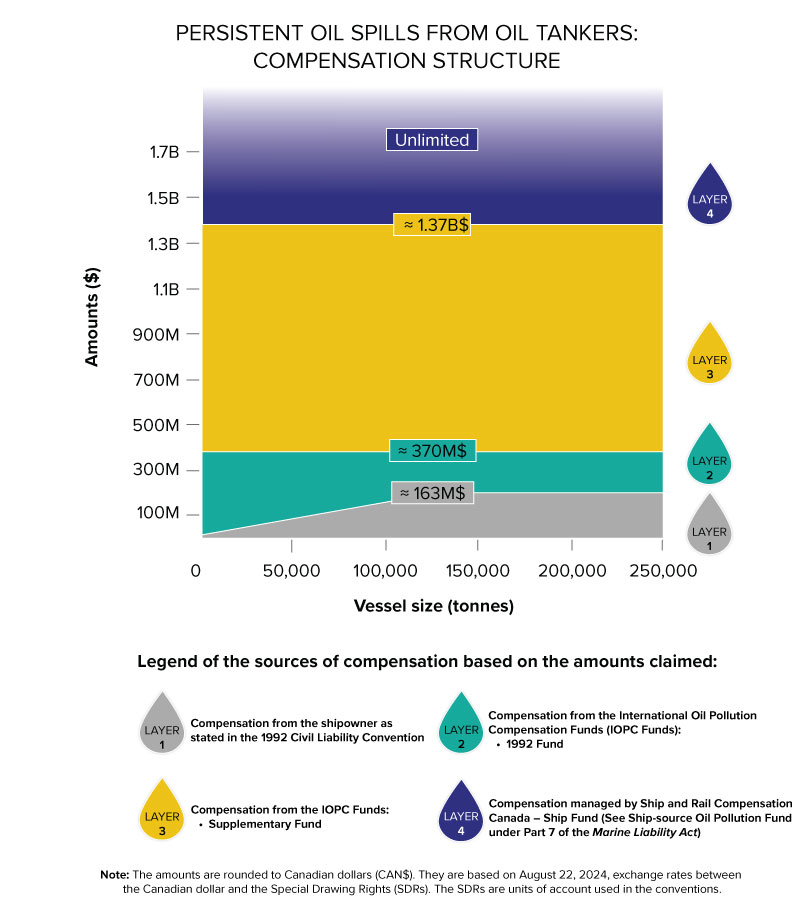Sector-specific claims
Fisheries and aquaculture
For the fishing and aquaculture sectors, including workers and business owners, Indigenous communities, and those involved in commercial and non-commercial activities in both fresh and salt waters.
Information for fisheries and aquaculture claimants
Handbook
Compensation handbook for fisheries, aquaculture and related activities
Checklist
Checklist for the fisheries sector PDF Word
Manuals
General claims manual
Expedited process for small claims
Infographic
Video
Introduction to compensation for fishers, aquaculturists, and all Involved in related activities
Municipal, local and Indigenous governments
For cities, towns, villages, districts, and band councils, including elected officials, employees, and their citizens.
Information for municipal, local, and Indigenous government claimants
Handbook
Compensation handbook for municipal, local, and indigenous government
Checklist
Checklist for local governments PDF Word
Manuals
General claims manual
Expedited process for small claims
Infographic
Video
Ports, harbours, and marinas
For ports, harbours, and marinas, including workers and operators, in both fresh and salt waters.
Information for ports, harbours, and marinas claimants
Handbook
Compensation handbook for ports, harbours, and marinas
Checklist
Checklist for local governments PDF Word
Manuals
General claims manual
Expedited process for small claims
Infographic
Video
Tanker and other major oil spills
Any incident caused by an oil tanker carrying persistent oil in bulk as cargo would be covered under the international regime and the International Oil Pollution Compensation Funds (the IOPC Funds). The Administrator is a member of the Canadian delegation at the meetings of the IOPC Funds and works closely with our international partners to ensure that Canadian claimants receive the support they deserve when it matters most.
Around $1.35 billion in compensation would be available from the tanker owner and their insurer, and the IOPC Funds. That amount is available to those affected, in addition to the compensation available from the Ship Fund.
In the event of a spill of this type, Canadians can submit their claims directly to us. The Ship Fund is available to pay all eligible claims.

Persistent Oil Spills from Oil Tankers: Compensation Structure
X-axis: Vessel in tonnes. Y-axis: Amount in dollars.
Legend
- Layer 1: Compensation from the shipowner (1992 Civil Liability Convention) – up to 163 million dollars.
- Layer 2: Compensation from the IOPC Funds (1992 Fund) – up to 370 million dollars.
- Layer 3: Compensation from the IOPC Funds (Supplementary Fund) – up to 1.37 billion dollars.
- Layer 4: Compensation by Ship and Rail Compensation Canada (Ship Fund) – unlimited.
Note: Amounts are rounded to Canadian dollars (CAN$), based on exchange rates on August 22, 2024, between CAN$ and SDRs, the units used in conventions.
We are working with our international partners to create a smooth and easy to understand process for claimants.
We are ready to compensate after a major oil spill
2023 marked a turning point in our major spill compensation preparedness. We now have agreements with three of the top compensation organizations in the world.
- International Group of P&I Clubs (IGP&I), which provides insurance coverage to approximately 90% of the world fleet.
- International Oil Pollution Compensation Funds (IOPC Funds), which provides compensation for oil pollution damage resulting from spills of persistent oil from tankers.
- ITOPF, which is made up of with world-leading spill advisors and claims assessors. They have provided services in over 840 incidents involving oil or chemical spills worldwide.
Together these agreements help foster collaboration among our organizations. We are planning for all three organizations to join us in tabletop exercises to address joint claims management issues.
See our blog posts on the signing of the agreements:
- Important Step Taken To Handle High Number Of Claims In The Event Of A Major Ship-Source Oil Spill Incident
- Important Milestone Reached To Handle Claims In The Event Of A Tanker Oil Spill
- Another Milestone Achieved In Our Preparedness To Help Canadians Get Compensation After a Major Spill
Maritime border spills
The United States has its own oil pollution responsibility and compensation system. We are working with our American partners, such as the U.S. Coast Guard’s National Pollution Funds Center, to prepare for an incident that affects both sides of the maritime border.
